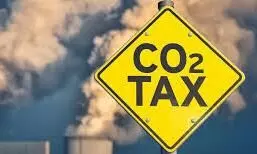
EU's carbon tax could impact India's GDP by 0.05%, says report
text_fieldsThe European Union's Carbon Border Adjustment Mechanism (CBAM) is set to impose a 25 percent tax on energy-intensive goods exported from India to the EU, according to a new report released on Wednesday.
This tax is projected to represent 0.05 percent of India's GDP, as highlighted in the report titled "The Global South's Response to a Changing Trade Regime in the Era of Climate Change," by the Centre for Science and Environment (CSE), an independent think tank.
Drawing on data from the past three years (2021-22, 2022-23, and 2023-24), the report details the EU's plan to tax imports of energy-intensive products such as iron, steel, cement, fertilizers, and aluminum, based on the carbon emissions generated during their production. The EU asserts that this mechanism will create a level playing field for domestically manufactured goods, which must comply with stringent environmental standards, while also helping to reduce emissions from imports.
However, this move has raised concerns among developing countries, which argue that it could harm their economies and make trade with the EU prohibitively expensive. The CBAM has also sparked debates at multilateral forums, including UN climate conferences, where developing nations contend that under UN climate change rules, no country should dictate how another reduces emissions.
Avantika Goswami, head of CSE's climate change program, noted that India's exports of CBAM-covered goods to the EU accounted for 9.91 percent of its total goods exports to the bloc in 2022-23. She highlighted that 26 percent of India's aluminum and 28 percent of its iron and steel exports were destined for the EU in the same period. These sectors form a significant part of the CBAM-covered goods exported from India to the EU.
In 2022-23, exports of CBAM-covered goods to the EU made up about 25.7 percent of India's total exports of such goods globally, underscoring the importance of these sectors. Notably, India does not currently export hydrogen and electricity to the EU. Overall, CBAM-covered goods exports to the EU constitute approximately 1.64 percent of India's total global goods exports.
The implementation of the CBAM represents a significant challenge for India's export economy, particularly for its energy-intensive industries, and highlights the ongoing global debates around fair trade and climate change responsibilities.






















